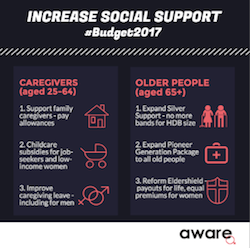-
Advocacy Theme
-
Tags
- Abortion
- Adoption
- Caregiving
- CEDAW
- Disability
- Domestic Violence
- Domestic Workers
- Harassment
- Healthcare
- Housing
- International/Regional Work
- Maintenance
- Media
- Migrant Spouses
- Migrant Workers
- Muslim Law
- National budget
- Parental Leave
- Parenthood
- Polygamy
- Population
- Race and religion
- Sexual Violence
- Sexuality Education
- Single Parents
- Social Support
- Sterilisation
- Women's Charter
AWARE calls for more shared responsibility for older people for 2017 National Budget
January 17th, 2017 | Family and Divorce, News, Older People and Caregiving, Poverty and Inequality, Press Release
This post was originally published as a press release on 17 January 2017.
 Gender equality group AWARE submitted its seventh annual set of recommendations for the National Budget through the public consultation portal REACH on 13 January.
Gender equality group AWARE submitted its seventh annual set of recommendations for the National Budget through the public consultation portal REACH on 13 January.
“The Budget will be announced on 20 February, the World Day of Social Justice,” said Jolene Tan, Head of Advocacy and Research at AWARE. “We hope the government commemorates the day with a stronger collective commitment to the dignity of older people.”
“This particularly helps women: first, women tend to face more financial insecurity in old age; second, when older people’s needs go unmet, women in the family make disproportionate sacrifices to ensure their care.”
This year’s recommendations urged the state to consider the needs of two groups who will be most affected by Singapore’s ageing population:
1. Older people (aged 65 and above), most of whom are women and many of whom lack resources to meet their own care needs. AWARE recommends:
- Expanding the availability and quantum of Silver Support, including by removing the different bands for HDB flats of different sizes
- Making healthcare in old age more affordable: exploring the possibility of adapting the Pioneer Generation Package for all generations
- Reforming Eldershield, including by removing the 72-month limit so that payouts are for life, and removing the gender difference in premiums
2. The next cohorts of women (aged 25-64) on track to becoming elderly persons, particularly those who, due to caregiving responsibilities, cannot participate in the workforce to accumulate private resources for their care needs in old age. AWARE recommends:
- Supporting home-based care by family caregivers
- Making formal childcare facilities more accessible to all mothers, including by relaxing and (for households with the lowest incomes) removing the employment preconditions for childcare subsidies
- Supporting all working adults in caregiving, regardless of gender, including by introducing eldercare leave and increasing the gender neutrality of parental leave
“We must face demographic realities. With a shrinking number of children within each family, we can nevertheless sustain social support if we look at the tax base as a whole, including the growing proportion of the working population who are migrants,” said Jolene Tan. “This is fairer and more realistic than relying primarily on private transfers of wealth within families to meet care needs.”
More details can be found in the full text of our submissions. Recommendations that we have made for the national Budget in recent years can be found on our website: 2016, 2015, 2014, 2013



